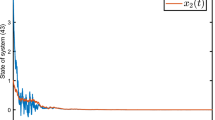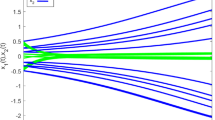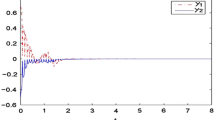Abstract
For delayed neural networks with randomly occurring uncertainties (ROU), this paper uses an improved integral inequality to optimize the stability of the receding horizon. The ROU follows some uncorrelated Bernoulli distribution white noise sequence, which it can enter the neural network in a free and random manner. By using a suitable lemma, the ROU problem added in this paper is transformed into a linear matrix inequality. Based on the auxiliary function-based integral inequality method, the new cross terms matrix of linear matrix inequality in the improved Lyapunov-Krasovskii functional is processed. Therefore, some new matrix variables containing more information are generated, so that the results have more degrees of freedom. This paper has obtained the new condition of the end-weighting matrix of the receding horizon cost function, thereby reducing its conservativeness and increasing its upper limit of delay. Finally, the superiority of the method has be illustrated by giving some simulation numerical examples.
Similar content being viewed by others
References
L. O. Chua and L. Yang, “Cellular neural networks: Applications,” IEEE Transactions on Circuits and Systems, vol. 35, no. 10, pp. 1273–1290, 1988.
J. Hopfield, “Neurons with grade response have collective computational properties like those of two-state neurons,” Proceedings of the National Academy of Sciences, vol. 81, no. 10, pp. 3088–3092, 1988.
Z. Lin, Y. Xia, P. Shi, and H. Wu, “Robust sliding mode control for uncertain linear discrete systems independent of time-delay,” Int. J. Innov. Comp. Inf. Control, vol. 7, no. 2, pp. 869–880, 2011.
A. N. Michel and D. Liu, Qualitative Analysis and Synthesis of Recurrent Neural Networks, Marcel Dekker, Inc., New York, 2002.
H. B. Zeng, Y. He, and M. Wu, “Passivity analysis for neural networks with a time-varying delay,” Neurocomputing, vol. 74, no. 5, pp. 730–734, 2011.
Q. Zhou, W. Wang, H. Liang, M. Basin, and B. Wang, “Observer-based event-triggered fuzzy adaptive bipartite containment control of multi-agent systems with input quantization,” IEEE Transactions on Fuzzy Systems, vol. 29, no. 2, pp. 372–384, 2021.
W. Wang, H. J. Liang, Y. N. Pan, and T. S. Li, “Prescribed performance adaptive fuzzy containment control for nonlinear multi-agent systems using disturbance observer,” IEEE Transactions on Cybernetics, vol. 50, no. 9, pp. 3879–3891, 2020.
R. H. Yang, H. Zhang, G. Feng, H. C. Yan, and Z. P. Wang, “Robust cooperative output regulation of multi-agent systems via adaptive event-triggered control,” Automatica, vol. 102, pp. 129–136, 2019.
Z. C. Li, H. C. Yan, H. Zhang, X. S. Zhan, and C. Z. Huang, “Stability analysis for delayed neural networks via improved auxiliary polynomial-based functions,” IEEE Transactions on Neural Networks and Learning Systems, vol. 30, no. 8, pp. 2562–2568, 2019.
H. B. Zeng, J. H. Park, and H. Shen, “Robust passivity analysis of neural networks with discrete and distributed delays,” Neurocomputing, vol. 149, pp. 1092–1097, 2015.
Y. Y. Wang, W. X. Zhou, and J. Luo, “Reliable intelligent path following control for a robotic airship against sensor faults,” IEEE-ASME Transactions on Mechatronics, vol. 24, no. 6, pp. 2572–2582, 2019.
Y. Wang, H. Shen, and D. Duan, “On stabilization of quantized sampled-data neural-network-based control systems,” IEEE Transactions on Cybernetics, vol. 47, no. 10, pp. 3124–3135, 2017.
A. Seuret, F. Gouaisbaut, and E. Fridman, “Stability of systems with fast-varying delay using improved Wirtinger’s inequality,” Proc. of IEEE Annual Conference on Decision and Control (CDC), Florence, Italy, DEC 10–13, pp. 946–951, 2013.
K. B. Shi, X. Z. Liu, and Y. Y. Tang, “Some novel approaches on state estimation of delayed neural networks,” Information Sciences, vol. 372, pp. 313–331, 2016.
P. G. Park, J. W. Ko, and C. K. Jeong, “Reciprocally convex approach to stability of systems with time-varying delays,” Automatica, vol. 47, no. 1, pp. 235–238, 2011.
T. Li, L. Guo, L. Wu, and C. Sun, “Delay-dependent robust stability criteria for delay neural networks with linear fractional uncertainties,” International Journal of Control Automation and Systems, vol. 7, no. 2, pp. 281–287, 2009.
H. B. Zeng, Z. L. Zhai, and Y. He, “New insights on stability of sampled-data systems with time-delay,” Applied Mathematics and Computation, vol. 374, 125041, 2020.
L. J. Banu and P. Balasubramaniam, “Robust stability analysis for discrete-time neural networks with time-varying leakage delays and random parameter uncertainties,” Neurocomputing, vol. 179, pp. 126–134, 2016.
Z. G. Wu, J. H. Park, and H. Y. Su, “Robust dissipativity analysis of neural networks with time-varying delay and randomly occurring uncertainties,” Nonlinear Dynamics, vol. 69, no. 3, pp. 1323–1332, 2012.
S. P. Xiao, H. H. Lian, H. B. Zeng, G. Chen, and W. H. Zheng, “Analysis on robust passivity of uncertain neural networks with time-varying delays via free-matrix-based integral inequality,” International Journal of Control Automation and Systems, vol. 15, no. 5, pp. 2385–2394, 2017.
C. K. Ahn and M. T. Lim, “Model predictive stabilizer for T-S fuzzy recurrent multilayer neural network models with general terminal weighting matrix,” Neural Computing and Applications, vol. 23, no. 1, pp. 271–277, 2013.
C. K. Ahn, P. Shi, and L. G. Wu, “Receding horizon stabilization and disturbance attenuation for neural networks with time-varying delay,” IEEE Transactions on Cybernetics, vol. 45, no. 12, pp. 2680–2692, 2015.
B. Yang, M. N. Hao, J. J. Cao, and X. D. Zhao, “Delay-dependent global exponential stability for neural networks with time-varying delay,” Neurocomputing, vol. 338, pp. 172–180, 2019.
K. Gu, J. Chen, and V. L. Kharitonov, Stability of Time-Delay Systems, Media, Springer Science Business, 2003.
C. K. Zhang, Y. He, L. Jiang, W. J. Lin, and M. Wu, “Delay-dependent stability analysis of neural networks with time-varying delay: a generalized free-weighting-matrix approach,” Appl. Math. Comput, vol. 294, pp. 102–120, 2017.
H. B. Zeng, Y. He, M. Wu, and J. H. She, “New results on stability analysis for systems with discrete distributed delay,” Automatica, vol. 60, pp. 189–192, 2015.
X. M. Zhang and Q. L. Han, “New Lyapunov Krasovskii functionals for global asymptotic stability of delayed neural networks,” IEEE Transactions on Neural Networks, vol. 20, no. 3, pp. 533–539, 2009.
L. Xie, “Output feedback H∞ control of systems with parameter uncertainty,” International Journal of Control, vol. 63, pp. 741–750, 1996.
J. H. Kim, “Further improvement of Jensen inequality and application to stability of time-delayed systems,” Automatica, vol. 64, pp. 121–125, 2016.
C. K. Ahn and M. T. Lim, “Receding horizon disturbance attenuation for Takagi-Sugeno fuzzy switched dynamic neural networks,” Information Sciences, vol. 280, pp. 53–63, 2014.
B. Yang, J. Wang, and J. Wang, “Stability analysis of delayed neural networks via a new integral inequality,” Neural Networks, vol. 88, pp. 49–57, 2017.
J. Hu, Z. Wang, H. Gao, and L. K. Stergioulas, “Robust sliding mode control for discrete stochastic systems with mixed time-delays, randomly occurring uncertainties and nonlinearities,” IEEE Transactions on Industrial Electronics, vol. 59, no. 7, pp. 3008–3015, 2012.
H. H. Lian, S. P. Xiao, H. C. Yan, F. W. Yang, and H. B. Zeng, “Dissipativity analysis for neural networks with time-varying delays via a delay-product-type Lyapunov functional approach,” IEEE Transactions on Neural Networks and Learning Systems, vol. 32, no. 3, pp. 975–984, 2021.
Y. He, M. D. Ji, and C. K. Zhang, “Global exponential stability of neural networks with time-varying delay based on free-matrix-based integral inequality,” Neural Networks, vol. 77, pp. 80–86, 2016.
H. B. Zeng, X. G. Liu, and W. Wang, “A generalized free-matrix-based integral inequality for stability analysis of time-varying delay systems,” Applied Mathematics and Computation, vol. 354, pp. 1–8, 2019.
W. Wang, H. B. Zeng, and K. L. Teo, “Free-matrix-based time-dependent discontinuous Lyapunov functional for synchronization of delayed neural networks with sampleddata control,” Chinese Physics B, vol. 26, no. 011, pp. 127–134, 2017.
S. P. Xiao, H. H. Lian, H. B. Zeng, G. Chen, and W. H. Zheng, “Analysis on robust passivity of uncertain neural networks with time-varying delays via free-matrix-based integral inequality,” International Journal of Control Automation, vol. 15, no. 5, pp. 2385–2394, 2017.
H. B. Zen, H. C. Li, Y. He, K. L. Teo, and W. Wang, “Hierarchical stability conditions for time-varying delay systems via an extended reciprocally convex quadratic inequality,” Journal of the Franklin Institute, vol. 357, pp. 9930–9941, 2020.
T. Wang, J. F. Ge, T. Li, X. Chen, and S. M. Fei, “Observer-based H∞ control for synchronization in delayed neural networks under multiple disturbances,” International Journal of Control, Automation and Systems, vol. 18, no. 12, pp. 3121–3132, 2020.
Author information
Authors and Affiliations
Corresponding author
Additional information
Publisher’s Note Springer Nature remains neutral with regard to jurisdictional claims in published maps and institutional affiliations.
Project supported by the National Natural Science Foundation of China (Grant nos. 61403278, 61503280). The authors are very indebted to the Editor and the anonymous reviewers for their insightful comments and valuable suggestions that have helped improve the academic research.
Liankun Sun was born in Tianjin, China, in 1979. He received his M. S. degree in control theory and control engineering from Tiangong University, Tianjin, China, in 2005, and a Ph. D. degree in control theory and control engineering from the Tianjin University, Tianjin, China, in 2009. In March 2009, he joined Tiangong University, where he is currently an associate professor. His current research interests include analysis and synthesis of networked control systems, Petri net theory and application, social computing.
Yanyu Wang was born in Hebei Province, China in 1996. She received a bachelor’s degree from the School of Computer Science and Technology, Renai College, Tianjin University, China in 2018. She is currently a graduate student in the School of Computer Science and Technology, Tiangong University. Her main research interests include neural networks, analysis and synthesis of networked control systems.
Wanru Wang received a master’s degree from the Department of Computer, School of Computer and Information Engineering, Tianjin Normal University, China in 2008. She joined Tiangong University in 2001 and she is currently a lecturer in the School of Computer Science and Technology. Her main research interests include networked control and computer applications.
Rights and permissions
About this article
Cite this article
Sun, L., Wang, Y. & Wang, W. Receding Horizon Stability Analysis of Delayed Neural Networks with Randomly Occurring Uncertainties. Int. J. Control Autom. Syst. 19, 3297–3308 (2021). https://doi.org/10.1007/s12555-020-0474-x
Received:
Revised:
Accepted:
Published:
Issue Date:
DOI: https://doi.org/10.1007/s12555-020-0474-x




